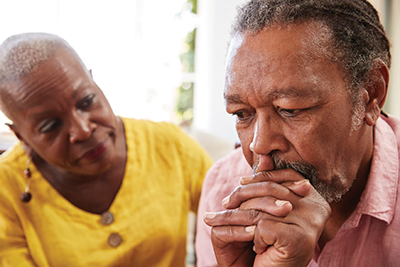
Submitted by Active Aging

Unfortunately, as we age, we lose close friends and family. Entering this stage of life can feel daunting as you anticipate the upcoming pain. However, knowing how you might process the grief and how to make positive meaning from the loss can increase your resilience. You’ll never become immune to the emotions that accompany loss, but you can improve the chances that you’ll come out the other side feeling whole and grateful for the company that you still have.
The Grieving Process
You’re likely familiar with the famous five steps of grieving, but other models can explain the process humans go through after a loss. You may try to avoid some of these stages and skip to the end, but psychologists agree that grief is a long process we must fully experience. Whether your own experience comes in three stages or nine, most people will go through some form of these steps.
Disbelief, Fog, Shock
Even if you know loss is coming, there is an element of shock and denial associated with a death. You may also feel numb or lost in a fog. Your brain is in a protective mode as you gather facts and begin to process the loss.
Yearning, Pain, Anger
When your brain has absorbed the facts of the loss, you’ll move on to stronger emotions that often involve pain and anger. Some people experience yearning and deep emptiness during this time. Expect to be fragile and react more intensely to other obstacles in life, even if they’re unrelated.
Bargaining, Searching
This stage involves a desire to make sense of the loss. Bargaining with a higher power, searching for logical answers, and trying to create an alternative narrative are all ways to keep the loss at an emotional distance for as long as possible.
Depression
More than just deep sadness, depression during the grieving process can happen with an especially meaningful loss. You may question your own mortality. Counseling can help immensely if your depression starts interfering with daily tasks such as eating and sleeping.
Reconstruction, Recovery
As your brain finally concedes that the loss is real and permanent, you begin to reconstruct your life without a loved one. You take inventory of your world and slowly pick up the pieces that have been dormant during the grieving process.
Hope, Acceptance
When our life begins to feel familiar again, when we can imagine joy after the loss, a phase of hope and acceptance begins. The pain is still fresh, but it does not dictate our decisions.
Making Meaning Out of Grief
During the depression, reconstruction, and acceptance phases, we start to make meaning out of our loss. Our brains are wired to process the facts of the situation and apply what we’ve experienced and learned to other parts of life. This meaning-making can be unconscious or purposeful, uplifting or detrimental. Taking a more active role in constructing positive meaning from a loss will help you feel in control and at peace after such a difficult time.
Avoiding a Downward Spiral
As you move through the depression and reconstruction phases, look out for all-or-nothing thinking. It can be easy to get trapped thinking that the challenging parts of grief are permanent or that your own life’s eventual end means that everything you do in the meantime is wasted. Most people have these thoughts while grieving, but letting them pass is essential.
Welcoming Positive Purpose
The recovery and acceptance phases are full of opportunities to find renewed purpose in life and make positive meaning from a tragic loss. Reframing your experience in a positive, empowering light can help you return to a whole and active life. Many people come out of grieving with a renewed desire to strengthen connections or pursue passions. Others find comfort in the warm memories they share with lost loved ones and go into each day focused on gratitude. These positive meanings can infuse your life with new wellness practices that benefit your mental, physical, and emotional health in the long term.
The Role of Relationships and Community
Your relationships and community influence all phases of grieving. It’s important to understand that everyone responds to loss differently. If you’re moved to support a friend or loved one during their grieving process, offer your presence rather than your process. Allow others to grieve in the time and way they choose. Similarly, if you crave support during your own grieving process, reach out to others and request specific action — company, food, distraction, shared memories, and opportunities to re-engage with life are all wonderful ways our communities can support us as we grieve.




Be the first to comment